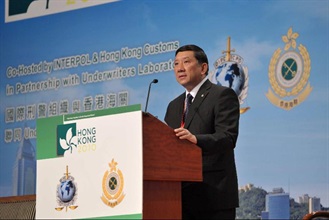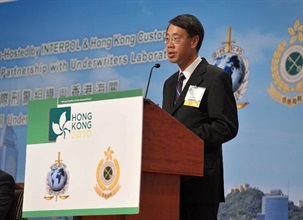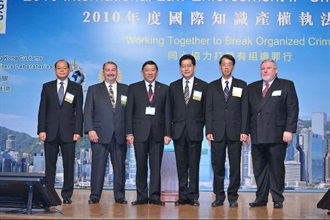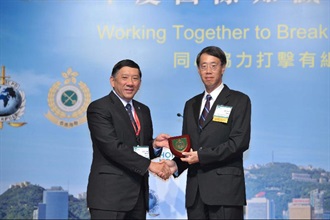INTERPOL and Hong Kong Customs join forces to improve regional police and customs anti-counterfeiting co-operation (with photos)
19 Oct 2010
Greater emphasis on the leadership role of police and customs and the benefits of working collaboratively is the focus of the 2010 International Law Enforcement Intellectual Property (IP) Crime Conference which opened today (October 19) in Hong Kong.
The conference is the first to be held in Asia and brings together some 430 law specialist IP crime investigators, prosecutors and private sector investigators from 28 countries. Co-hosted by INTERPOL and Hong Kong Customs in partnership with Underwriters Laboratories Inc (UL), the three-day event (October 19 to 21) concentrates on collective efforts to work together to break organised crime. It will include a series of operational workshops to enable subject-matter experts to discuss how all those affected by counterfeiting and piracy can better work together to break up the organised criminal gangs which manufacture and distribute fake goods on a regional and increasingly global scale.
The Under Secretary for Commerce and Economic Development, Mr Gregory So, highlighted at the opening ceremony that co-operation among jurisdictions and timely intelligence exchange are pivotal to the fight against transnational organised IP crime. "To stay ahead of such a challenge, we need to help each other to prevent IP criminals from arbitraging between regions. More precisely, we need cross-sector co-operation among law enforcement agencies, IP crime affected industries, rights holders and relevant stakeholders to share efforts, intelligence and resources to counter transnational organised IP crimes effectively," said Mr So.
"Organised criminals play a central and omnipresent role in every aspect of transnational IP crime," said INTERPOL President Khoo Boon Hui. Mr Khoo reported that with 145 (77%) of INTERPOL's 188 member countries now affected by organised IP crime, 48% of all IP crime cases were transnational, with 12% of cases linked to other areas of organised crime. "The need for police and customs to work together to combat this dangerous criminality which increasingly impacts on the health and safety of consumers has never been more important. This collaboration has already proved to be a winning formula in South America and will work for us in other regions."
Hong Kong Customs Commissioner Richard Yuen confirmed that organised IP criminals are using increasingly sophisticated manufacturing and distribution networks to move their pirated goods around through physical boundaries like ports and airports or virtual boundaries on the Internet. He added that to protect society against the harm of counterfeit goods and support economic growth through promotion of innovation and creativity, IPR enforcement agencies must work together within and outside national boundaries so that we can effectively counteract and combat international IP criminal syndicates.
"There are no simple answers to the complex problem of organised IP crime, but solutions can be developed through co-operation and partnership," said Charlie Abounader, President Product Safety, Underwriters Laboratories. "This unique operational forum enables a wealth of information, experience and expertise - from both the public and private sectors - to be shared and channelled into a common goal, which is to defeat transnational IP crime."
Notable participants from Asia, including Mainland China, were joined by others from Africa, Europe, the Middle East and North America, including the Attorney General of the United States, Mr Eric Holder, who delivered a key note address.
Key features of the conference will include hands-on and interactive training provided by Hong Kong Customs in a simulated Internet crime scene, as well as access to the online International IP Crime Investigators College, an INTERPOL-driven initiative in partnership with UL University delivering leading-edge training to equip investigators with the necessary skills to effectively combat current and emerging threats from IP crime.
Ends/Tuesday, October 19, 2010
Press Release
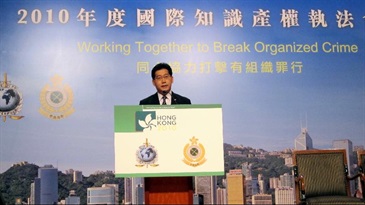
 The 2010 International Law Enforcement Intellectual Property Crime Conference was officially opened in Hong Kong today (October 19). The three-day conference is co-hosted by INTERPOL and Hong Kong Customs. It is the fourth in a series that is held as an annual event and the first to be staged in Asia. The theme of this year's conference is "Working Together to Break Organised Crime". Picture shows Under Secretary for Commerce and Economic Development, Mr Gregory So, speaking at the opening ceremony.
The 2010 International Law Enforcement Intellectual Property Crime Conference was officially opened in Hong Kong today (October 19). The three-day conference is co-hosted by INTERPOL and Hong Kong Customs. It is the fourth in a series that is held as an annual event and the first to be staged in Asia. The theme of this year's conference is "Working Together to Break Organised Crime". Picture shows Under Secretary for Commerce and Economic Development, Mr Gregory So, speaking at the opening ceremony.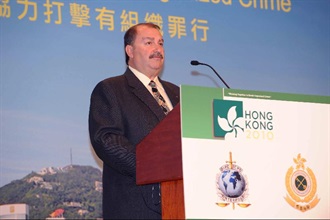
 President, Product Safety, Underwriters Laboratories, Mr Charlie Abounader speaks at the opening ceremony.
President, Product Safety, Underwriters Laboratories, Mr Charlie Abounader speaks at the opening ceremony.